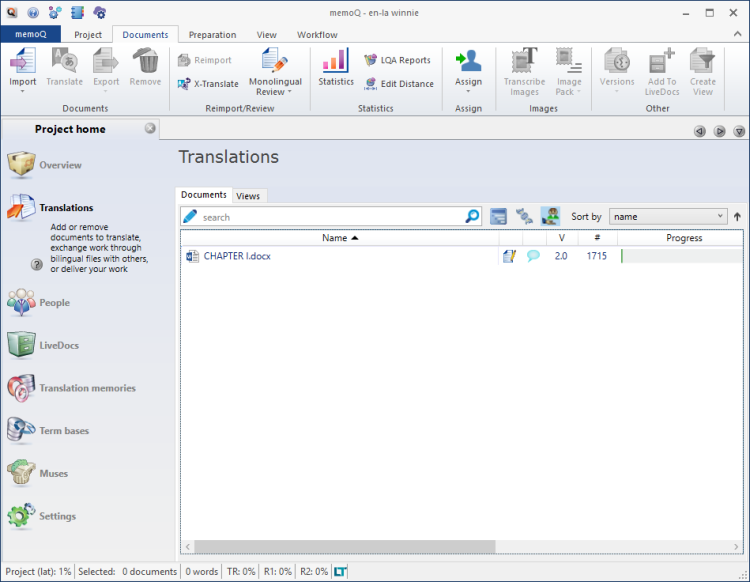Project home
When you create or open a local project, it will appear in a tab called Project home.
From Project home, you can see the documents, the resources, and the settings of the project. You come here when you need to import new documents, or export finished documents, or when you need to add a translation memory, or change the segmentation rules. You can also get reports about the project.
When you open documents or other resources for editing, they will appear in separate document tabs.
To make changes to the project, click the Project home tab.
How to get here
Open a local project: On the Dashboard, find it in the list, and double-click its name. Or, right-click the project name, and choose Open.
In the project manager edition, you need My Computer: If you are using memoQ project manager, make sure that the server selector shows My Computer. If you click Open on an online project, it will open in the memoQ online project window. To learn more, see Help about the Dashboard.
Or, create a local project: On the Project ribbon, click New project. The Create new project from template window opens. Add documents, and fill in the necessary details, then click OK. memoQ will open the project in Project home.
Or, check out an online project from a memoQ server: On the Project ribbon, click Check Out from Server. The Check out online project window opens. Choose the project to check out, and click Check out project. memoQ creates a local copy of the online project on your computer. It will contain only those documents that were assigned to you. The checkout then lives on as an online project: next time, you simply need to open it. memoQ will synchronize its contents with the memoQ server.

What can you do?
If you need to translate or edit translations, everything you do starts from Project home.
- To import, export, translate, or manage documents: Click Translations. The Translations pane appears. Most of your activity happens or starts from the Translations pane.
- To deal with the resources that give you suggestions from earlier translations or databases: Click LiveDocs, Translation memories, Term bases, or Muses.
- To change the way memoQ splits the documents into segments, or the way it deals with quality assurance: Click Settings.
- To get reports about the project: Click Overview.
If you are using memoQ project manager, you can send work to others: Use the People, Translations, and Overview panes for that. The People pane will not show if you are using memoQ translator pro.
If your project is connected to Language Terminal, you can send a quote to your client: This happens on the Finances pane. The Finances pane will not show if your project is not connected to Language Terminal.
When you need to check or change anything in your project, it starts with one of the panes in Project home. To learn more about each pane, click one of the links below:
- Project home – Overview (translator pro edition)
- Project home - Overview (project manager edition)
- Project home – Translations (translator pro edition)
- Project home – Translations (project manager edition)
- Project home - People (project manager edition)
- Project home - Finances
- Project home – LiveDocs
- Project home – Translation memories
- Project home – Term bases
- Project home - Muses
- Project home – Settings
When you finish
To close the project: Click the Close icon in the Project home tab: ![]() Or, on the Project ribbon, click Close Project.
Or, on the Project ribbon, click Close Project.
You can close memoQ, too, if you do not need to work on another project.
You can start creating another project: If you do that, memoQ will automatically close your current project.
Project managers, you can switch windows: You can open several online projects for management. Each online project opens in a separate window. To switch between them and the Dashboard or Project home (if you have a local project open): press and hold down Alt, and press Tab a few times until you get to the window you want. Or: On the Windows taskbar, click the memoQ icon, and then click the window you want to switch to.